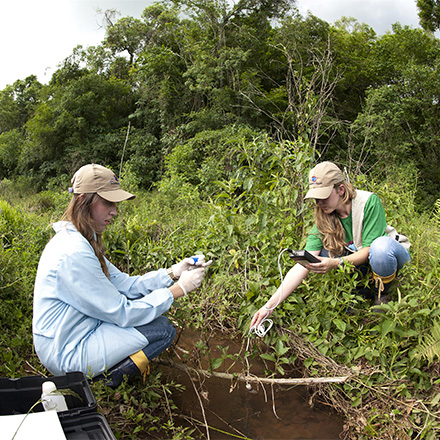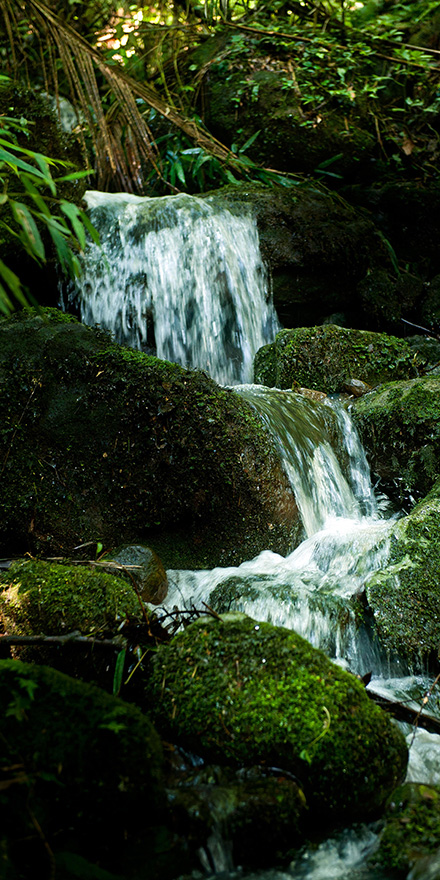Our local agronomists in Brazil first recognized the potential for this project. Always on the lookout for ways to improve living standards in the areas where we work, we saw this as an opportunity for a tangible project with potentially great benefits.
The program was designed to last five years, beginning in 2011. Working with the University in Santa Cruz do Sul (UNSC) on the technological side, crucial springs were identified in the Andréas Brook Hydrographic Sub‐Basin. These springs ultimately supply the town of Vera Cruz with drinking water.
The Andréas Brook runs through a rural area that is comprised of many small-scale farms that produce agro-industrial products, raise cattle and grow crops, including tobacco, dry beans, corn, horticultural products and fruits.
Universal worked with UNSC to develop the research, planning, program development, strategy development and implementation and subsequent data collection to evaluate the project's success and ultimate water quality.
Small scale farmers in the area volunteered to serve as “Water Protector Agents.” These farmers participate in the Payment for Environmental Services (PES) program. Although this is a voluntary program, the farmers' participation results in an atmosphere of ownership, which ultimately improves the environment as a result of better business practices and resource management.
Once the springs were identified and their quality was diagnosed, steps to improve the water quality were established. These included periodic monitoring of the water quality and flow, as well as guidance and resources for protecting the springs. A total environmental approach was promoted, discussing good practices and conservation-oriented management with the farmers, along with improvements in the native forest coverage.
One of the most significant steps was to build 21 kilometers of fencing to keep livestock away from the water sources. This not only prevents water contamination from the animals, but also allows vegetation to regrow along the banks of the water sources. Seedlings were also planted along the fences to increase the regrowth of native vegetation.
Sanitation improvements were also made at five of the springs shown to have poor water quality.
Another issue that Universal has been working on is the prevention of soil erosion. We have long promoted no‐till farming techniques in the area, and that became more widespread with this project.
Our agronomists encourage farmers to leave vegetation in the troughs between rows of crops. While the fields look overgrown from a distance, the plants between the troughs help minimize erosion caused by heavy rains and drainage. This allows the soil to retain nutrients that are lost with heavy erosion. The practice is becoming more widespread, and as many as 70 percent of farmers are now practicing the techniques in these areas.
The project involved a total of 67 farmers acting as guardians of the water in Linha Andreas and Dona Josefa. More than 144 hectares of land and 103 water sources were protected in the watershed.
Samples were collected monthly at 20 sites to be evaluated for physical, chemical and microbiological characteristics. A hydrological measurement unit was also set up to monitor the water flow and quality of the Andréas Brook. Furthermore, the evolution of forest recovery in the areas surrounding the water sheds was monitored through pictures and satellite images.
The water quality was measured according to criteria established by the Brazilian Environmental Counsel. Water quality is categorized into five classes—Special Class (or pure) and Classes 1-4, with Class 1 being the best quality and Class 4 being the poorest. Throughout the course of the project, the amount of higher quality water (Classes 1 and 2) rose from 44 percent to over 75 percent. This improvement indirectly benefits approximately 14,000 people.
The total investment in the project was 590,000 euros.
In 2012, the project received special recognition by the Brazilian National Water Agency as being a typical Water Producer Project. This certification allows the possibility for the Vera Cruz Municipality to receive federal funds designated for certified PES projects. In 2013, the municipality of Vera Cruz recognized the Water Guardian Project as a concrete example of conscious action that may change the future through engagement, awareness and partnerships.
Due to the success, the municipality of Vera Cruz enacted a law in June 2015 to continue the project, exempting landowners enrolled in the Water Guardian Project from the payment of water taxes.
The result has been a win-win for both the community and the farmers. The town is enjoying better water quality than ever and farmers are financially benefiting from reduced erosion. The government's desire to keep the project going and choosing to fund it demonstrates just how successful Project Water Guardian is.
We are now exploring whether we can take this model and implement it elsewhere in Brazil, as well as other areas throughout the world.







